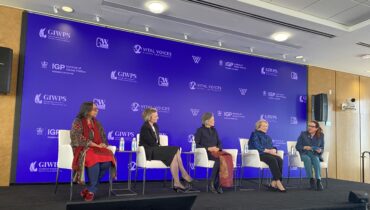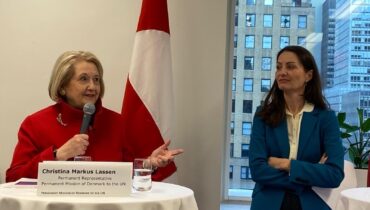High-level political leaders came together with grassroots peacebuilders at The Rockefeller Foundation’s Bellagio Center in June. There, the leaders discussed climate change, women’s political leadership, and standing with and supporting peacebuilders on the frontlines of conflict in a discussion co-hosted by GIWPS and The Rockefeller Foundation and chaired by Secretary Hillary Rodham Clinton.
“It brought together women from the frontlines of conflict with global leaders to really dig in depth into the issues plaguing women in conflict zones around the world,” said GIWPS Managing Director Carla Koppell. “That connection between the two was really unique, special, and added dimensionality to this partnership.”
Participants included current and former heads of state and high-level political leaders from Australia, Ecuador, Finland, Japan, Kosovo, Lithuania, Mexico, New Zealand, and Northern Ireland.
Frontline peacebuilders represented several conflict areas–including Afghanistan, Israel and Palestine, Sudan, Ukraine, and Yemen. They spoke on behalf of a broader group of activists who attended earlier convenings that GIWPS hosted with Sudanese women peacebuilders in Kampala, Uganda; Ukrainian women peacebuilders in Warsaw, Poland; and Afghan women peacebuilders in Washington, DC. The purpose of these meetings was to develop recommendations for policymakers on inclusive decision-making and recovery.
Muna Luqman, who is the founder of Food4Humanity, co-founder of the Women in Solidarity Network, and a peacebuilder in Yemen, joined the Global Women Leaders Summit.
“Knowing that so many historic people have been here, people who have changed our lives during history but also even now, I think that gave me hope. It gave me inspiration that we can do something. Peace is possible,” she said.
The summit led to several outcomes including an open letter from the Global Women Leaders to the UN Secretary-General, which urged the inclusion of Afghan women in the Special Envoys and the Special Representative on Afghanistan meeting in Doha, Qatar. This letter marked the first time that the Global Women Leaders collectively advocated for the recognition and codification of gender apartheid in international law.
The leaders also authored a letter to the Conference of the Parties (COP) presidency, the heads of delegations for COP29, and the UNFCCC focused on the importance of including gender perspectives in climate finance ahead of COP29, which will take place in Baku later this year. They also developed a collective call to action ahead of the 25th anniversary of United Nations Security Council Resolution 1325, the landmark resolution on women, peace and security adopted in 2000 to highlight the role of women in preventing conflict.
The Global Women Leaders also endorsed the Mother’s Call, a joint initiative of two Israeli and Palestinian organizations, Women Wage Peace and Women of the Sun, to bring peace to the region.
This was the third annual Global Women Leaders Summit that GIWPS convened in partnership with the Rockefeller Foundation as part of a larger initiative–Global Women Leaders Network–which aims to address global challenges and form a united force to advance gender equality.
“I don’t think there’s a place like the Bellagio Center that is so conducive to thinking and bringing people together,” said Ambassador Melanne Verveer, executive director of GIWPS. “Having the connected Global Women Leaders validate and support the work of women peacebuilders at the grassroots level is enormously valuable to the participants and impactful.”


